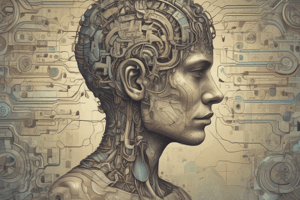Podcast
Questions and Answers
What is the DSM definition of a mental disorder?
What is the DSM definition of a mental disorder?
- A condition only caused by psychological factors
- A problem in sociocultural factors affecting mental health
- A syndrome characterized by clinically significant disturbances in cognition, emotion regulation, or behavior (correct)
- A dysfunction only in the biological processes underlying mental functioning
Which factor does NOT reflect the DSM-5 definition of a mental disorder?
Which factor does NOT reflect the DSM-5 definition of a mental disorder?
- Impairment in cognitive functioning
- Dysfunction in the psychological processes
- Normal variation in emotion regulation (correct)
- Significant disturbance in behavior
What was the primary goal of the DSM's emergence?
What was the primary goal of the DSM's emergence?
- To focus solely on sociocultural factors influencing mental health
- To classify mental disorders based on neurological causes
- To provide a common definition of disorders and promote study of them (correct)
- To introduce demon possession as a psychiatric diagnosis
What did DSM-II mainly focus on?
What did DSM-II mainly focus on?
Which theory was NOT historically used to explain mental disorders before the DSM?
Which theory was NOT historically used to explain mental disorders before the DSM?
What was the major improvement in the DSM-III compared to its predecessors?
What was the major improvement in the DSM-III compared to its predecessors?
What was one of the concerns leading to the move for DSM-5?
What was one of the concerns leading to the move for DSM-5?
Which DSM revision added consideration of culture to its criteria?
Which DSM revision added consideration of culture to its criteria?
What is a major change introduced in DSM-5 regarding the structure of diagnoses?
What is a major change introduced in DSM-5 regarding the structure of diagnoses?
Why is Evidence-Based Practice considered to have significant limitations?
Why is Evidence-Based Practice considered to have significant limitations?
Which DSM revision aimed to be empirical and resolve the question of categorical vs. dimensional elements of disorders?
Which DSM revision aimed to be empirical and resolve the question of categorical vs. dimensional elements of disorders?
What aspect was emphasized in the DSM-IV revision compared to DSM-III?
What aspect was emphasized in the DSM-IV revision compared to DSM-III?
What is the main goal of the DSM-5 process according to Kendler et al. (2009)?
What is the main goal of the DSM-5 process according to Kendler et al. (2009)?
What is a common concern surrounding the DSM-5 as mentioned in the text?
What is a common concern surrounding the DSM-5 as mentioned in the text?
Which factor was NOT a cause for concern regarding the DSM-5 process?
Which factor was NOT a cause for concern regarding the DSM-5 process?
What significant change was introduced in the development process of DSM-5 compared to DSM-IV?
What significant change was introduced in the development process of DSM-5 compared to DSM-IV?
What impact did some critics fear regarding the DSM-5 regarding mental illness?
What impact did some critics fear regarding the DSM-5 regarding mental illness?
How did Kendler et al. suggest changes should be made in the DSM-5?
How did Kendler et al. suggest changes should be made in the DSM-5?
Study Notes
Psychiatric Diagnosis and the Classification System
- Mental disorders can be difficult to identify and classify, and theories have evolved over the years from demon possession to humoral imbalance, sociocultural factors, and neurological/medical disorders.
Definition of Mental Disorder
- A mental disorder is a syndrome characterized by clinically significant disturbance in an individual's cognition, emotion regulation, or behavior that reflects a dysfunction in the psychological, biological, or developmental processes underlying mental functioning.
Goal of the DSM
- The goal of the DSM is to provide a clear, common definition of disorders, foster communication among disciplines, promote the study of disorders, clarify treatment options, and inform payment structures.
Emergence of the DSM
- The DSM has evolved over the years, from DSM-I (1952) to DSM-5, with changes aimed at improving reliability, validity, and cultural consideration.
Concerns Leading to DSM-5
- Concerns leading to the development of DSM-5 include the need to acknowledge political aspects of diagnosis, resolve categorical vs. dimensional elements of disorders, and address the medicalization of diagnosis.
Evidence-Based Practice
- Evidence-based practice aims to identify best practices, but it has limitations, as it only describes what is "average" and does not account for individual variations.
DSM-5 Process
- The DSM-5 process aimed to create a manual that is usable by clinicians, guided by research evidence, and maintains continuity with previous editions while making revisions for better clinical practice.
Criticisms of DSM-5
- The DSM-5 process has been criticized for its potential to add millions of people to the rolls of those with mental illness, raising concerns about stigma, excessive prevalence, and cultural insensitivity.
Studying That Suits You
Use AI to generate personalized quizzes and flashcards to suit your learning preferences.
Description
Explore the concept of psychiatric diagnosis, classification systems, and the evolution of theories regarding mental disorders. Topics include demon possession, humoral imbalance, sociocultural factors, and neurological/medical disorders according to Bonder's 'Psychopathology and Function, Sixth Edition'.




